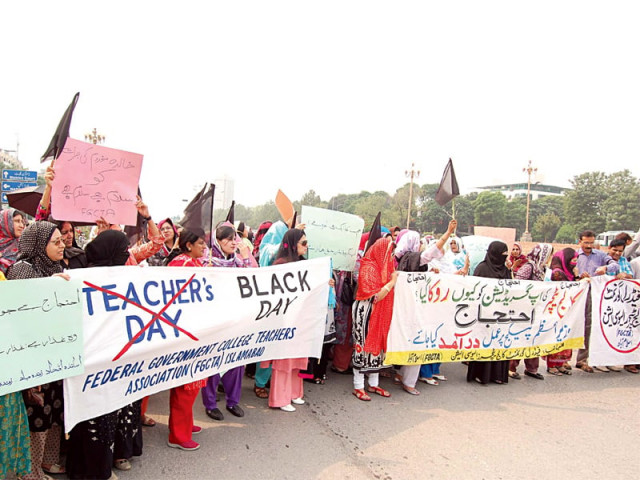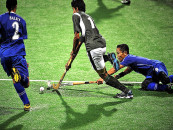World Teachers Day: Anger, reverence and calls for change
Teachers protest at Parade Avenue; call for changes in curriculum, emphasise teachers’ role in gender equality.

As many as 700 teachers of federal government colleges observed the World Teachers’ Day on Wednesday as black day.
They gathered at Parade Avenue near the Parliament House and protested over the non-implementation of the up-gradation package announced by the prime minister on October 8, 2010.
They hoisted black flags, held banners and placards inscribed with the slogans condemning the “ignorance of the bureaucrats”. They held the Capital Administration and Development Division responsible for creating hurdles in the implementation of the package.
“What is the justification of the celebration of the teachers’ day if the teachers are being forced to take to the roads,” said Federal Government College Teachers Association President Syed Zahid Ali Shah, while addressing the teachers’ rally. “The day has no relevance for us if we are humiliated and our rights marginalised,” said the president.
Elsewhere in the twin cities, students acknowledged the contributions their teachers have made to their lives.
At Roots School System, students put up a vibrant show with banners and cards adorned with glitter, glaze papers, ribbons and stickers. Classrooms were decorated with banners and charts inscribed with poetry, quotes and sayings on teachers.
A multimedia presentation on the “role of a teacher in a child’s life” was played and students performed mimicry and skits. Homemade gifts and cakes baked by mothers were sent to teachers at schools. As a finale, the school choir sang a song dedicated to the teachers.
Moreover, an awareness walk was organised by UNESCO and Ghazali Trust from China Chowk to Parade Avenue. A large number of educationists, school children and representatives of civil society and organisations participated in the walk. They also carried banners and placards highlighting the importance of a teacher in educating society.
Structural changes in curriculum stressed
At a seminar, Aamir Riaz, author of the book “What are we teaching our children?” raised concerns about the curriculum being taught at all levels in Pakistan. It is unfortunate that curriculum in the country is marred with a typical mindset, that reflects unwanted inclusion and emission of facts and events, he said.
Other experts at the seminar highlighted the multiple anomalies in the curriculum, designed for students from grade one to 10, and stressed for the need to purge the curriculum of discrimination against non-Muslims, glorification of war, gender stereotyping, biases against diversity of language and culture and blatant distortion of history.
Peace Education and Development (PEAD) Foundation Executive Director Samina Imtiaz said the text books recommended for both public and private schools lack content to assist students in critical thinking and appreciation of the events and happenings.
The content in Urdu books, she said, glorifies war and violence in one way or other. Other chapters stereotype women by highlighting their role as home workers skilled in sewing, cooking and embroidery work. Between provinces, the curriculum in Khyber-Pakhtunkhwa is the worst, he said.
She lamented that Urdu curriculum in Khyber-Pukhtunkhwa as compared to other provinces had more of Islamic content.
PEAD Foundation Director Dr Afzal Babar said that private schools in Pakistan are following curriculum designed by multinational publishers. He said that it was the responsibility of government to oversee whether the curriculum was designed in context of Pakistan.
He added that while these publishers did take care of country-specific context when publishing for countries like Sri Lanka and India, but in case of Pakistan, they did not take into account particular local context simply because there was no check and balance system in the country. He said some private institutions were propagating myopic ideas resulting in students’ incapacity to develop critical outlook.
Sustainable Development and Planning Institute Senior Advisor Ahmed Saleem said that there was need to differentiate between facts and fancies. He blamed the government and curriculum development authorities of polluting the real events, history and culture of people with ideological fantasies that had already played havoc with our education system. There is no space for reasoning and questioning; civic responsibility, cultural diversity and soft skills like fine art and literature, he added. It is pity that mother languages are being discriminated and people are forced to forgo their basic right to have mother language as medium of instruction, he said.
Renewing the pledge of the pursuit of knowledge
A seminar held at the National Library auditorium to honour the World Teachers’ Day turned into an elaborate discourse on the current status of education in Pakistan and pragmatic measures for its improvement.
The seminar, focusing on this year’s theme “Teachers for gender equality”, was organised by a forum of 8,000 teachers from around the country. Members from United Nations Educational, Scientific and Cultural Organization (UNESCO), United Nations Children’s Fund (UNICEF), United Nations Development Programme (UNDP), International Labour Organization (ILO) and about 200 teachers attended the seminar to discuss issues affecting teachers and the education system in Pakistan.
UNESCO representative Dr Kozue Kay Nagata stressed the importance of having female teachers in bringing more female students in the classrooms. She also stated that the working conditions for educators must be improved tremendously to compensate for the hard work teachers put in and to garner a strong education system.
UNICEF representative Dr Don Rohrmann said education will eliminate gender inequality and lead to even further avenues of learning for the Pakistani people. He also said that in the wake of this year’s Sindh floods, there is an opportunity to school children who have never been to school before if disaster management is done taking education in consideration.
Recognition and support
Teachers’ role is pertinent in the character building of youth, which is supposed to be the central part of all education syllabi. This was stated by Sir Syed Memorial Society President Brig (retd) Iqbal Shafi, at a seminar on “teachers rights and role in development” held at Islamabad Girls College F-6/2.
Character building, he said, is crucial for us to take the nation forward. We also need to propagate gender equality in education. Only teachers can do this because they still command respect in society, he said.
He added it was “quite embarrassing” that teachers had been forced to take to the roads to fight for their rights. “We need to honour to our teachers by providing them their rightful respect and the status that they deserve as the nation builders,” Shafi said.
Principal Islamabad College for Girls Shaista Pirzada said, “Girls’ education should be top priority as the educated women have backbone role in the socio-economic development.”
With additional inputs from press releases issued by Roots School System, ActionAid, Ghazali Trust.
Published in The Express Tribune, October 6th, 2011.



















COMMENTS
Comments are moderated and generally will be posted if they are on-topic and not abusive.
For more information, please see our Comments FAQ